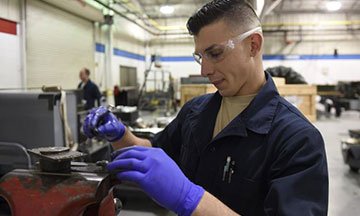Reliability Centered Maintenance Training Course
| Date | Venue | Duration | Fees | |
|---|---|---|---|---|
| 06 May - 10 May, 2024 | Dubai | 5 Days | $4750 | Register |
| 26 May - 06 Jun, 2024 | Doha | 10 Days | $9150 | Register |
| 03 Jun - 07 Jun, 2024 | Dubai | 5 Days | $4750 | Register |
| 29 Jul - 02 Aug, 2024 | Dubai | 5 Days | $4750 | Register |
| 12 Aug - 16 Aug, 2024 | Dubai | 5 Days | $4750 | Register |
| 19 Aug - 23 Aug, 2024 | Paris | 5 Days | $5695 | Register |
| 30 Sep - 04 Oct, 2024 | Dubai | 5 Days | $4750 | Register |
| 21 Oct - 25 Oct, 2024 | Dubai | 5 Days | $4750 | Register |
| 04 Nov - 06 Nov, 2024 | London | 3 Days | $4475 | Register |
| 04 Nov - 08 Nov, 2024 | Dubai | 5 Days | $4750 | Register |
| 02 Dec - 06 Dec, 2024 | Dubai | 5 Days | $4750 | Register |
Course Overview
What is Reliability-Centered Maintenance?
Reliability Centered Maintenance is commonly referred to as RCM. It is a methodology that makes sure that all of the assets continue their typical working, which is required of them by their users in the current operating context.
What are the benefits of Reliability-Centered Maintenance?
Generally, RCM is utilized in industries where safety, reliability, and cost-effectiveness are required most. Nevertheless, the industries where it can be applied are Petroleum, Agriculture, Manufacturing, Defense, Aerospace, Transportation, Facilities, Pharmaceutical, Food Processing, Maritime, Chemical Processing, Alternative Energy, Mining, Power Generation, Energy Distribution, and so on.
Zoe’s RCM Certification Course is designed considering the requirements of the changing world and to ensure that individuals are trained to perform best in the workspace. The experts of the RCM Professional Certification Course deliver the knowledge of RCM’s history, current trends, and field information and train the individuals for hands-on experience.
Course Objectives
The primary objective of the RCM Professional Certification Course is to train the trainees in:
- Understanding the history of the RCM
- Understanding the Evaluation Criteria for RCM Processes
- Comprehending the application of the RCM and how it is applied in different industries as per current trends
- Understating the interaction with the actual failure
- Using basic curve methods for modelling the failure modes
- Preparing the strategies to avoid or repair the potential and actual failures, respectively
- Deciding which type of maintenance is required for mitigating the risk
- Understanding the predictive and preventive methods for avoiding the risks and mitigating them
- Receiving hands-on experience in the field
- Grasping the concepts and terminologies of the RCM
Training Methodology
Zoe Talent Solutions understands that the RCM course is versatile due to its vast application. Considering this, the professionals ensure that everything is aligned to the changing dimensions of the RCM and machinery of each industry. Before getting started with new sessions, each course is checked thoroughly to add new content and remove outdated topics. In this way, the professionals ensure that all the courses are new and up-to-date. Trainees’ productive participation is ensured through Do–Review–Learn–Apply Model, which is meant to maximize trainees’ learning experience during the session. This model utilizes different methods like role-plays, projects, group activities, and so on. These methods ensure each trainee’s participation throughout the session.
Organisational Benefits
The RCM Professional Certification is meant to prepare the experts who can benefit the organization in the following ways:
- Achieving the optimal level of safety, economy, and availability
- Experts who can take precautionary measures to mitigate the risks
- Better decision-making ability of the individuals
- Experts who understand the changing dynamics and trends of the market and work accordingly
- Experts with the ability to develop and apply processes engineering and supportability analysis tools and cutting-edge systems
- Better audit of the equipment
- Critically understating the equipment’s performance
- Better identification systems require improvements
- Cost-saving on a variety of equipment by applying timely measures and mitigating the risks
Personal Benefits
This course is meant for the following benefits to the individuals:
- Enhancing confidence in making decisions about capital equipment
- Analysing failure data and making use of it
- Increasing ability to audit the equipment
- Improving machine uptime due to more dependable plant and operational equipment
- The abilities of Capital equipment planning and budgeting can be more precise
- Using quantitative (and explainable) formulas to make informed risk judgments on paper
- Ensuring to provide management with the best plant utility and performance
- Increased chances of getting employed in giant firms
- Opening doors to different industries that look forward to experts
Who Should Attend?
- Fleet/asset managers who aim for leading the development and execution of the strategies and plans for asset management
- Logisticians are responsible for purchasing the equipment
- Executive management whose role involves overseeing and managing the equipment
- Maintenance planners/managers who are responsible for maintaining the equipment
- Individuals who are in charge of developing strategies to mitigate the risks related to organizations’ facilities
- The maintenance Technician is responsible for installing and repairing the equipment
- Maintenance superintendents are responsible for guiding, coordinating, and overseeing the work plan for maintenance
- Capital project managers are in charge of managing the capital of the assigned project
- Supportability professionals
- Reliability managers/engineers
- Plant engineers
- Operations directors
- Field service representatives
- Facilities engineers
- Asset/equipment owners
- Maintenance supervisors
- Design engineers
- Reliability engineers
- RCM team members
- Plant Performance engineers
- Maintenance analysts
- Any individual who has an interest in the RCM field and wants to pursue a career in this field
Course Outline
Essential topics and areas meant to be covered in this RCM Professional Certification Course are given below:
Module 1: Introduction to RCM
- What is RCM?
- What functions are performed in maintenance?
- Some common misconceptions
Module 2: Overview of RCM
- Benefits of RCM
- Application of RCM
- History of RCM
- Recent trends of RCM
Module 3: Evaluation Criteria for RCM Processes
- What are the seven questions of RCM?
- What are the possible answers to those seven questions?
Module 4: Key Terms and Equipment Elements
- What are the key terms related to RCM?
- What are the elements of equipment performance?
- Recognizing the stakeholders in the journey of RCM
Module 5: FMEA
- What are modes of failure?
- What are the impacts of each mode of failure?
- What are the mechanisms for each failure mode?
- Assessment of the cost of failure
Module 6: Failure Data
- What is Failure data?
- What are the six curves?
- Usage of 6 curves and how to draw each?
Module 7: Preventive Maintenance (PM)
- Definition of PM
- Advantages
- Impacts
- How is it done?
- Explain the kinds of PM
Module 8: Predictive Maintenance
- What is Predictive Maintenance?
- What are the types of predictive maintenance?
- What are the benefits of predictive maintenance?
- What are the steps of predictive maintenance?
- Difference between predictive and preventive maintenance
Module 9: Choosing Appropriate Maintenance Task
- Run-to-Failure
- Repair/Replacement
- Comparing Maintenance Strategies Based on Cost and Availability
- Service Tasks
- Failure-Finding Inspections
- One-Time Tasks
- Published Task Selection Questions
- On-Condition Inspections
Module 10: Standard that affects the Maintenance of the Equipment Care
- Standardization and standard
- Risk, energy, environment, etc
Module 11: Equipment Partitioning
- What is equipment partitioning?
- How is it done?
- What are the benefits of equipment partitioning?
- Does it work in every situation?
Module 12: Real-world Examples and Working
- Some real-world work is done in the field











